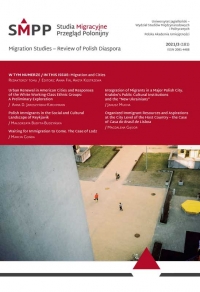Concultural Practices of Young Ukrainians as a Challenge for the Intercultural Openness of Warsaw
Concultural Practices of Young Ukrainians as a Challenge for the Intercultural Openness of Warsaw
Author(s): Urszula Markowska-Manista, Marta PietrusińskaSubject(s): Politics / Political Sciences, Politics, Social Sciences, Sociology, Rural and urban sociology, Migration Studies, Inter-Ethnic Relations
Published by: Wydawnictwo Uniwersytetu Jagiellońskiego
Keywords: concultural practices; intercultural openness theories; Ukrainians as migrants in Warsaw; urban inclusion policy
Summary/Abstract: Institutional intercultural openness is a crucial part of urban inclusion policy towards migrants. In cities with a long history of social and cultural diversity such as Berlin, London or Amsterdam, intercultural openness provides migrants with full or partial participation, initiating activities in the metropolitan space, access to public resources, and social security. In Warsaw, a relatively new inflow of economic migrants from Ukraine, who constitute a large and heterogeneous group, has necessitated changes in municipal cultural and integration policies to facilitate the needs of the new group of recipients. In our article, we focus on results from 91 interviews with Ukrainian students living in Warsaw conducted between 2019 and 2020. We analyse whether, how and why young immigrants from Ukraine use the offer of Warsaw’s cultural institutions; what their expectations are and how their cultural participation is connected with their acculturation and integration. Our research shows that despite the fact that Warsaw tends to build up its culturally open policy for diverse participants, it is not adjusted to the needs of young Ukrainians. As a result, this new diaspora begins to create its own conculture (not to be confused with counterculture). We understand this phenomenon as a set of cultural practices initiated by a minority group of migrants in their new place of residence, which result from the national cultural script of this group. Through these practices, this group cultivates the community, without any connection to the dominant (national) culture of the wider society they belong to or in the space of which its members live. On the one hand, the diversification of a municipal cultural offer allows migrants to find their preferred places and events within Polish culture, although on the other hand, it creates a space for the development of concultural practices that can lead to ghettoisation.
Journal: Studia Migracyjne - Przegląd Polonijny
- Issue Year: 2021
- Issue No: 3
- Page Range: 319-344
- Page Count: 26
- Language: English

